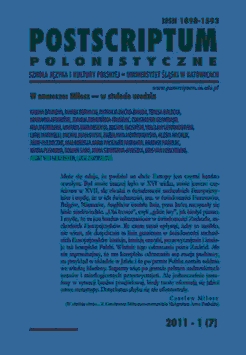„Kłopoty z opisem rzeczy”, czyli (nie)możliwość mimesis w epoce relatywizacji podmiotu
Problems with Depicting Things. The Impossibility of Mimesis in the Epoch of the Relativization of the Subject.
Author(s): Arent van NieukerkenSubject(s): Language and Literature Studies
Published by: Wydawnictwo Uniwersytetu Śląskiego
Keywords: Miłosz; dilemmas of the subject
Summary/Abstract: At first sight it appears that Miłosz‟s poetry shares many features with modernist and postmodernist poetics. One of its main themes is the impossibility of verifying the veracity of man‟s sensual impressions (i.e. their referring to an „external‟ world), which seems to undermine the traditional concept of literature as „mimesis‟. However, Miłosz expressly rejected the postmodernist point of view that literature as „mimesis‟ is merely a textual effect. Even when the speakers in his poems expressly deny the possibility of recreating the external world of man‟s sense-impressions by means of language, they seem to achieve the very thing they wanted to deny. One of Miłosz‟s favourite devices in the poetry of his middle period was the so-called „irony of self-betrayal‟. But this negative way of affirming the covenant between the self and the world did not satisfy him in the long run. Wishing to overcome the antinomies of mimesis he attempted to work out a poetical strategy allowing him to describe the astonishing richness of being more directly. This strategy required a metaphysical justification. The veracity of man‟s sensual and intellectual involvement with the world turned out to be rooted in the religious perspective of „apokatastasis‟. „Time past‟ and „time present‟ are one in a process that both redeems and transcends time, without annihilating the moments of which it consists. Miłosz‟s long poems of the sixties and seventies should therefore not be simply understood as „literature‟ or independent „works of art‟ (poésie pure) that could be separated from other forms of being. In fact they are part of a process of redemption that occurs „here and now‟, although it remains unclear when it will be completed. For that reason Miłosz‟s longer poems should be read as „open texts‟ or – but in a sense opposite to the postmodernist idea of „unfinishedness‟ – „work in progress‟. They purport to present the manifold phenomena of a man‟s existential autobiography simultaneously.
Journal: Postscriptum Polonistyczne
- Issue Year: 7/2011
- Issue No: 1
- Page Range: 65-98
- Page Count: 34
- Language: Polish

